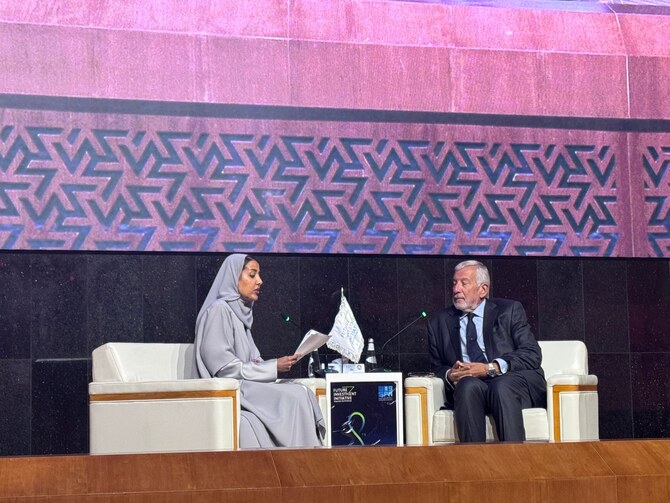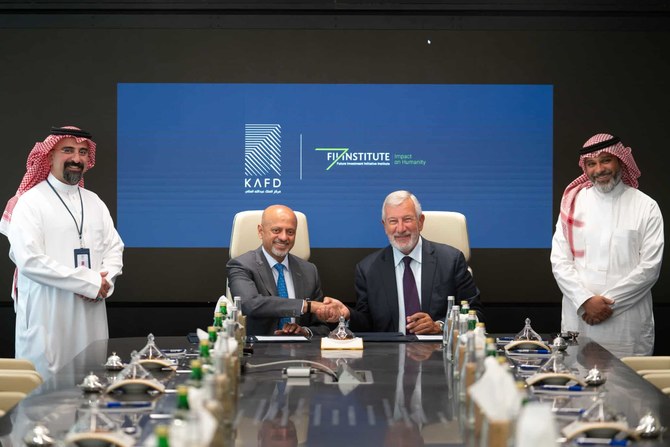DUBAI: Artificial intelligence and new technologies will top the agenda when the Future Investment Initiative (FII) holds its eighth conference in the Saudi capital, Riyadh, from Oct. 29 to 31, CEO of the FII Institute Richard Attias has said.
Dubbed “Davos in the Desert,” FII is a platform where global leaders, CEOs, entrepreneurs, and policymakers gather to shape the future of industries, governance, and humanity.
While the annual conference has historically drawn participants from the financial sector, Attias told the Arab News current affairs program “Frankly Speaking” this week that this year’s gathering marks a significant shift toward tech-driven industries.
“At the beginning of FII, the majority of our participants and delegates were coming from the financial sector, from sovereign wealth funds, private equities, and I would say the key ‘old economy’ industries,” said Attias.
“This year, we are extremely happy to see that we have more and more people coming from the tech industries, including AI, because AI is everywhere, and AI is now. And AI is disrupting almost all industries and all sectors.”
This focus on AI reflects broader global trends. With industries from healthcare to entertainment being transformed by new technologies, Attias says FII seeks to bring together tech innovators and established global players to explore the potential of these innovations.
“If you ask me what I want the legacy of the FI Institute to be, it is to be really an inclusive platform, a bridge between global CEOs from the traditional economies and young entrepreneurs,” he said.
Attias has developed and produced more than 2,000 events over a career spanning 30 years, including the World Economic Forum Annual Meeting at Davos, the Clinton Global Initiative, Nobel Laureates Conferences, the New York Forum, and the UNESCO NGO Forum.
When FII first got off the ground in 2017, it was met with skepticism in some quarters. Many questioned whether the world needed another forum for business and political leaders, and there were doubts about Saudi Arabia’s ability to pull off such an ambitious event.

FII CEO Richard Attias told the Arab News current affairs program “Frankly Speaking” this week that this year’s gathering marks a significant shift toward tech-driven industries. (AN Photo)
However, FII has not only survived but thrived. In the past seven yers, the conference has facilitated deals worth $128 billion — an indication, perhaps, that FII is far more than just a networking opportunity.
“I don’t want to be too pretentious, but I think we don’t see any more skeptical people,” said Attias. “When people come back and come back every year, this is the answer. Because global CEOs don’t have time to lose. Time is money for them.”
He added: “People are coming back because they find great content, they are inspired, they realize that these platforms, such as FII, are calls to action. They also make deals. It’s not just about networking. It’s really making deals.”
Another indicator of its success is how it bounced back from the lockdowns and travel restrictions imposed on such events during the coronavirus pandemic.
“COVID-19 has proven that in-person meetings are absolutely crucial,” said Attias. “And despite the virtue of the hybrid formulas of conferences, people are coming back again and in even bigger numbers.”
Attias believes the choice of Saudi Arabia as the host country for FII has been integral to its success, with the Kingdom’s strategic location making it a natural meeting point for the world’s economic centers of gravity.
“Saudi Arabia is definitely a global hub today, and it is, I would say, a catalyst between north and south and west and east,” he said. “It is extremely well located if you look at the world map.”
Attias highlighted the forum’s role in fostering discussions between key global powers. “We see great conversations between Chinese and Americans,” which is significant given the complex geopolitical dynamics at play.

FII Institute CEO Richard Attias speaks at a press conference in Riyadh on Tuesday to announce details about the eighth edition of FII. (AN Photo)
More than that, Attias views Saudi Arabia as a prime example of a nation that is investing and adopting innovation to power its economic transformation.
“Beyond FII, the Kingdom of Saudi Arabia is definitely now a place where global conversations are happening on multiple industries, on mining, on the future of aviation, on the future of logistics, on the future of technology, and so forth,” he said.
“You have an amazing program, a vision called Vision 2030. And if people read Vision 2030 very well, they understand that this country is in full transformation, creating amazing sectors, which are contributing to the diversification of the economy.
“And the Kingdom is moving from being an oil-producer economy to a very diverse economy. So all these platforms are becoming the global conversations on all these sectors which are supporting the diversification of the economy. And this is how Saudi leads.
“And people are very happy to come here. It reminds me of what happened in China 20-plus years ago when China moved from almost a country which was one single economy to an open global economy.”
With attendees flying into Riyadh from across the globe, FII appears to have emerged as a truly international platform.
“This year, despite the fact that for many people you need to become a member of the organization, of the FI Institute, we are approaching a number of 8,000 global CEOs, C-suites, entrepreneurs, and public figures,” said Attias.
This diverse representation ensures that the discussions at FII are rich with insights from various perspectives, industries, and regions. “It’s a real global conversation,” said Attias, with 30 percent of attendees coming from the US, 20 percent from Europe, and 20 percent from Asia.

FII is committed to fostering positive change through effective solutions across various domains, including global connectivity, mining, AI, health-tech, sports, the other key areas. (AN Photo)
One of FII’s most critical contributions to global development is its emphasis on sustainable investment. From renewable energy to healthcare and affordable housing, FII aims to encourage investments that have a lasting impact on humanity.
“The way you measure a long-term impact is how investment, for example, in sustainable developments are happening, in renewable energy, in sustainable agriculture, in green infrastructure,” said Attias.
The forum has pioneered a new ESG (environmental, social, and governance) framework, which Attias refers to as his ESG 2.0 framework. The new model is necessary because “the current one was not fair and was excluding emerging countries,” he said.
Attias believes the adoption of this new framework could unlock trillions in new investment for regions like Asia and Africa, helping to combat challenges like climate change and social inequality. “This has a direct impact on quality of life, which means impact on humanity,” he added.
FII’s influence is not confined to Riyadh. The initiative has expanded globally with satellite events in major cities like Miami, London, and Rio. Attias sees these events as essential to expanding FII’s global relevance.
“We decided to go also to our members’ regions, continents, and countries. This is why we will have an FII satellite event, what we call a FII priority summit, on each continent,” he said.
Attias believes FII is uniquely positioned to address some of the world’s most pressing issues. From inflation and climate change to digital transformation, the forum brings together “visionary thinkers, game changers, and innovators to discuss solutions,” he said.
Business leaders are particularly concerned about economic uncertainty, rising interest rates, and supply chain disruptions — issues that are top of mind for many attendees, said Attias.
But FII does not just focus on the challenges — it aims to inspire optimism. “People need to talk, people need to be inspired, people want to exchange ideas, and people want to be optimistic,” Attias said.

A partnership between Riyadh’s King Abdullah Financial District Management and Development Co. and the Future Investment Initiative Institute, launched last year, is set to drive the Saudi capital’s economic resilience and prosperity. (Supplied)
Indeed, he said the forum is committed to fostering collaboration and developing actionable solutions that can be implemented on a global scale.
“By having unexpected conversations, in total transparency, where people who are sometimes having separate visions, separate approaches, is helping to solve the problem,” said Attias. “And when people come with solutions and actions, definitely the question after is implementation.
“But we see more and more leaders now who are changing their mindset. They don’t want just to be visionary leaders or dreamers, to quote His Royal Highness, the Crown Prince (Mohammed bin Salman), he said this place is a place for dreamers and doers, talking about the Kingdom of Saudi Arabia.
“And I think this is what FII is about. FII is a global conversation where you see many dreamers who are doers.”
Despite the backdrop of ongoing conflicts in Gaza, Lebanon, and beyond, Attias says FII attendees remain focused on the positive role that investment and collaboration can play in creating stability.
“We saw that even last year, our conference was happening just after the dramatic Oct. 7, I would say, catastrophe,” he said. “I was expecting people to maybe pull out, not attend. It was the opposite, everybody came. And they wanted to have this conversation.”
He added: “They want to continue to be optimistic because they know that it’s only by building prosperity that you will bring peace. It’s only by investing in these regions that you will fight against terrorism. And it’s only by sending a message of optimism that you will show that our world is extremely resilient.
“And it’s also a message to politicians (that the) private sector will continue to do what we have to do for the benefit of our employees, for the benefit of our citizens, for the benefit of our countries.”
Attias remains confident the world will overcome its present challenges — as long as conversations like the annual FII event continue.
“Humanity is extremely resilient. Trust me,” he said. “We saw that after COVID-19, and this is why this global conversation is happening. I think ultimately, we will see the light at the end of the tunnel. I am convinced of that. And we will build and continue to build a sustainable world.”




















